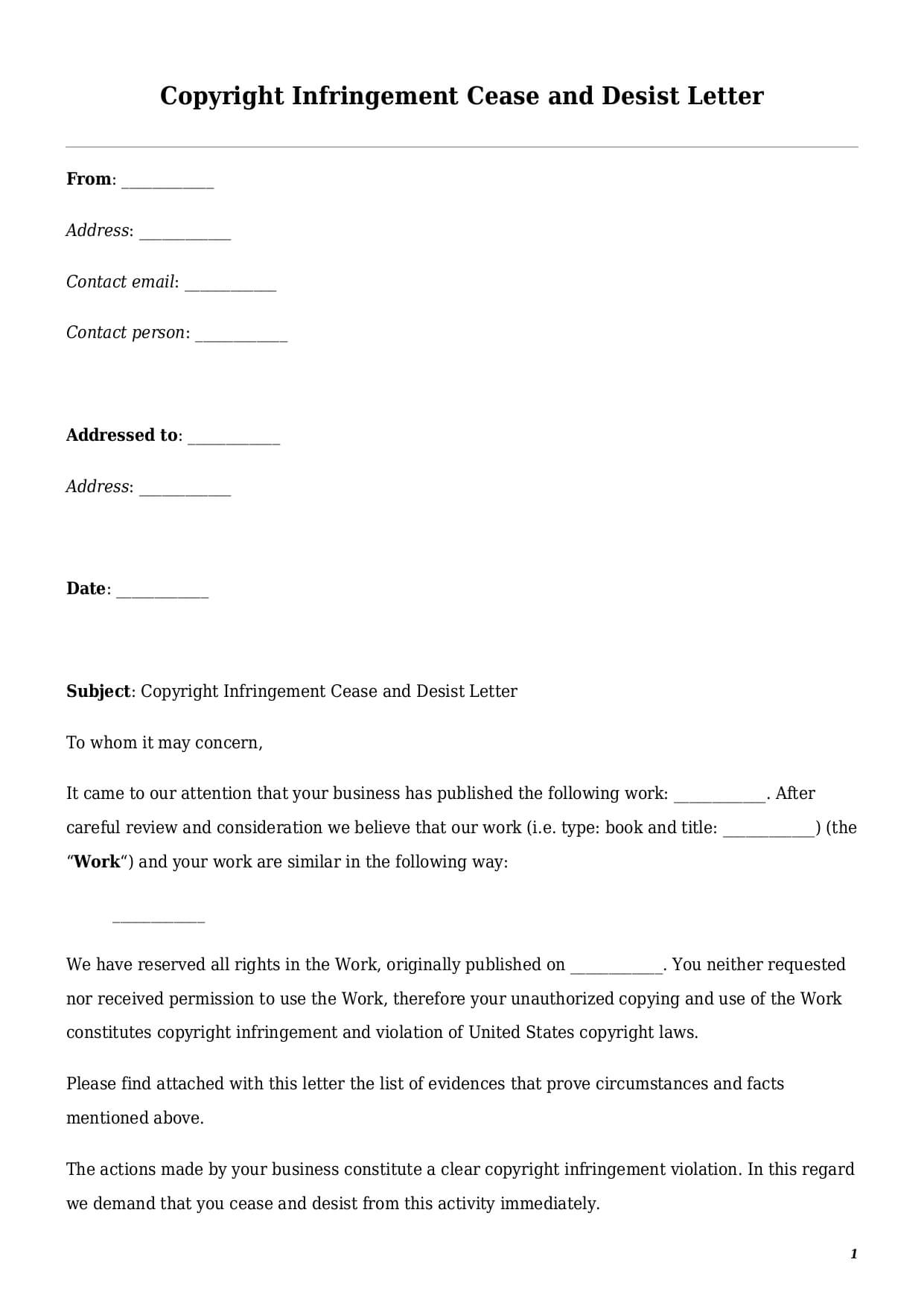Copyright Infringement Cease and Desist Letter
Reviews


What is a copyright infringement cease and desist letter?
A copyright infringement cease and desist letter is a formal legal notice requesting a third party to stop violating copyrighted material. This letter is also known as an IP cease and desist letter template that is used to stop infringement of intellectual property rights.
This template can be used to cease and desist violation of different types of copyright, including movies, music, songs, books, novels, photos, etc.
The violation of copyright may take various forms:
- copying or distribution of a third party’s book without permission;
- sharing illegally online digital copyright (e.g., images, icons);
- using copyrighted photos or music without the license;
- selling pirated software and many more.
The present template for cease and desist letter is used to immediately stop violation of copyright. This is a good practice to first send such a letter to offenders. It helps to avoid bringing the matters to the court from the very start.
A copyright infringement cease and desist letter template is an effective legal tool to protect the owner’s right over a copyright from unauthorized usage.
How to Write a Copyright Infringement Cease and Desist Letter Template?
Creating a template for cease and desist letter is a challenging process. Therefore, we created a short list of tips you may follow to create your own document from scratch:
Formal Tone
A cease and desist letter template is an official request to stop infringement. Therefore, it should be written in a short and concise manner. The best way to stick to a formal approach is to avoid the inclusion of emotional words and phrases.
Describe infringed copyright
Make sure the text for the cease and desist letter template describes in detail the violated copyright, including the following details:
- full name and type (e.g., book, song, photo); and
- date of first publication or release.
Explain the infringement
It is vital to explain how exactly the violation of a copyright takes place. It may take different forms like illegal distribution, publication, etc. Precise examples should be provided, as it helps the recipient to better understand the problem in question. Do not forget to attach supporting documentation like photos or screenshots, as it helps to maintain a better legal position.
State your legal rights
A good template for cease and desist letter should mention that the rights of the original owner are protected by the copyright laws of the United States. By virtue of that, a guilty party might be requested to pay damages later on.
Do not forget to state that if the matter cannot be resolved in an amicable way, the matter can be brought to the court.
Date and Sign
For a copyright infringement cease and desist letter template to become a legally binding document, the sender should sign and date it.
Table of content
Frequently Asked Questions (FAQ)
-
1. How do I send a copyright infringement notice?
Neither federal nor state laws define the exact way how to send a copyright infringement cease and desist letter. You can deliver it in person, by courier, by mail, or via email.
Despite the chosen method, keep a written record of sending such a notice.
-
2. How do you respond to a copyright infringement letter?
There are various ways you can answer upon the receipt of a copyright infringement cease and desist letter:
– Ignore it;
– Request additional information or clarifications from a sender;
– Deny allegations and place your counterarguments.
Please be aware that each of the suggested ways above may lead to serious legal consequences. Therefore it is highly recommended to seek legal advice.

Looking for something Different?
Start typing to find out our collection of legal documents and contract templates
